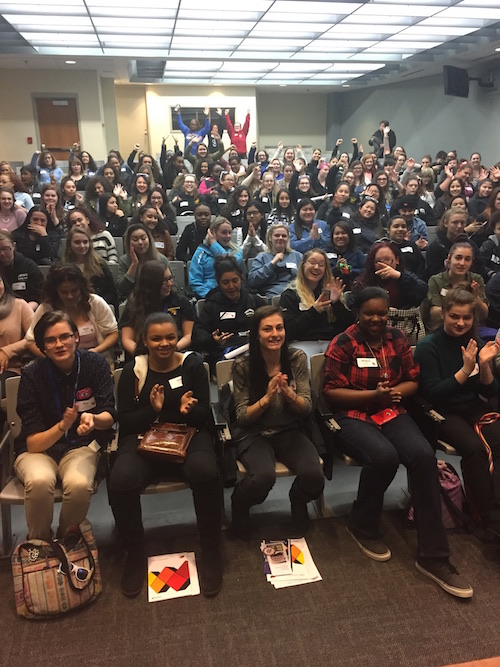Continuing a new tradition, Boston Local 103 hosted more
than 350 girls from eastern Massachusetts area high schools on March 2 for a conference
and career fair to encourage their interest in the skilled trades.

|
Hundreds of girls from more than 20 area high schools convene at Boston Local 103 to learn about a career in the trades. Photo credit: James O'Connell, Minuteman High School senior.
|
The conference was sponsored by Massachusetts Girls in Trades, an organization dedicated to establishing a pipeline for school-aged girls to enter the union skilled trades.
More than 3,000 young women in high schools across Massachusetts are enrolled in construction trades programs, said Maryanne Ham, administrator at Minuteman High and a founding board member of Girls in Trades.
Yet many seem to face barriers upon graduation. In 2015, tradeswomen accounted for just over 6 percent of apprentices in the Bay State, according to the Boston Globe. Nationally, it’s less than 3 percent.
Some of these barriers include sexual harassment, gendered perceptions of women’s capabilities and lack of mentors, according to a study by the National Women’s Law Center. It found that women leave apprenticeships at higher rates than men, citing problems like hostile work environments and lack of child care. The study also stated that, while women have made great strides in other traditionally male-dominated fields like medicine and law, construction remains lopsided.
“A great place to start helping these women remove these barriers is within the union trades. There is a large membership with access to tradeswomen who can act as mentors,” Ham said.
The number of female apprentices in Massachusetts has grown from 4.2 percent to almost 7 percent, said Liz Skidmore, business representative and organizer for the New England Regional Council of Carpenters.
"We're very excited that we’ve almost doubled the number of female apprentices,” Skidmore said. “And we look forward to those women retiring in 30 years after a proud career of building Massachusetts with the protection of a full pension."
Having more women in the trades can also help with the shortage of skilled construction workers. In addition to working with girls, the conference offered networking opportunities and a workshop for educators on apprenticeships and what teachers and counselors can do to encourage students to apply.
Additionally, said Ham, students at career and technical education schools have had opportunities to explore a variety of career pathways and find their passion early on.
“Our students have four years of trade experience and can do more in the field quicker than the average apprentice,” Ham said. “I’ve wondered for years why the union construction trades have not expanded their outreach before and am grateful they are now. To me this seems like a win for all.”
If the student feedback is any indication, these girls may indeed be the next generation of tradespeople.
“I'm not alone and many women are breaking gender roles,” reported one student in an anonymous survey given at the end of the conference. Others said, “I learned that I have no limits in what I can do,” and, “being nontraditional is different for everyone.”
Many students also shared what they learned about unions, how they offer protection, benefits and apprenticeships – and that they can in fact join one.
A second conference will be held on April 13 in western Massachusetts. Mark Kuenzel, training director for Springfield, Mass., Local 7 serves on the steering committee and attended the conference last year.
He said he frequently hears from female students that they’re planning to go to college and get a degree in electrical engineering. They say their parents want them to go, despite spending the last four years learning a trade that can get them into an apprenticeship – and a high-paying career without student loan debt.
“Not everyone is cut out for the trades, we all know that,” Kuenzel said. “But it’s a missed opportunity for a lot of girls.”
“These are good jobs,” Skidmore said. “There’s no good reason why there aren’t more women.”
Massachusetts Girls in Trades was established in 2015 and is comprised of representatives from education, business and labor, including Local 103. In addition to the conference, the organization has a student group, Equity in the Trades Student Leadership Council, for girls, and holds parent and alumnae events.
While organizations and events dedicated to women and girls in the trades are not new – similar entities exist in California, Illinois, Mississippi, Oregon and Vermont – this is the first of its kind in Massachusetts.
“This is the first time we have intentionally supported girls in the trades,” said Michelle Roche, director of career and technical education at Minuteman High, one of the more than 20 schools that participated. “Our model is being looked at in other states.”